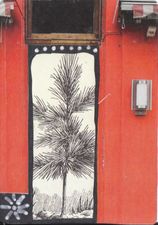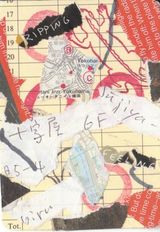|
Margaret Stawowy's poems can now be heard on Voetica, a website with a mission to bring poetry alive by providing recordings of works read aloud by poets.
My Father-in-Law Returns from the Dead
He seemed so happy to see me. Skin pallid, but eyes lively, and hair vigorous as crab grass. He sat contentedly among my family, tucked between two aunts who ignored him. It was at my Polish grandmother’s house, a continent away from his Japanese grave. Our Lady of Czestochowa, black faced and solemn, sent blessings from her frame on the dining room wall. I asked what it’s like on the other side. He said it’s one side. Then he turned himself into a lap dog for the amusement of the children. Later, he limped into the street, looking for a ride back to the city of the dead. There were no taxis. Still, he waited and waited. I knew then how much I misunderstood him. http://www.upthestaircase.org/margaret-stawowy.html Playing Life with My Daughter and City of Cancer
Tokyo, Obon Week
Not concrete but earth pulsing beneath. Native plants break through blacktop while cicada drones drown all silence. The six o'clock temple bell rings at 6:05. That's how heavy the air hangs. All day, everyday, dead heat. Nobody breathes. Only crickets chant cooling prayers on schedule. Buddha-like bullfrog punctures the evening air with a belch. Out farts the foul wind of kitchen and bath sewage, then merciful veil of night falls. Now all make way to electric islands. Buy what the living and dead need: sake incense rice crackers flowers. Shuffle home under the rabbit moon when out of nowhere a ghost drifts past, cold breath on a sweaty neck. Back home you see the cockroaches have been in your pillow book again They don't need words to endure just paper The motorcycle tribes think vehicles have meaning. Screech it all night long through corridors of sleeplessness, but nothing changes. Night always ends. The crows know exactly when. The dark beaks ask only for the torn trash bag. Spirits grab a last bite from altars, remember the taste of life, then disappear on pulsing black wings. (Obon Week is a Japanese holiday in mid-August when souls of ancestors and the deceased return to visit their families.) http://www.asiancha.com/content/view/192/110/ Thousands of Starlings
It started in November. By December, flocks rolled out of trees at dusk in casts of thousands, flew away above the freeway, against backlit skies of burning rose and lavender, fleet winged, amorphous clouds, endless waves of avian ocean performing patterns of liquid fluidity, confounding with improbable formations, reconfigurations. Even the commuters in lane hierarchies woke up from apathies acknowledged the anarchic art of birds with trash pedigrees. Quite frankly these usurpers of native species, spoilers, riffraff, parking lot hoipolloi should be offed. But for now the starlings are redeemed. Those brilliant bastards are magicians and we applaud them. Featured at Marin Poetry Center http://www.marinpoetrycenter.org/poempage.php?firstname=margaret&lastname=stawowy Looking Both Ways
In autumn, I go to Cuba with Gregory Peck. We are pieces of a collage, he and I, glued on a mismatched timeline, and though I am beyond childhood, he calls me Scout. At dawn, we eat pan tostado with café con leche. Sometimes we ride the bus; sometimes we walk. In between, we perform scenes from Chekhov for spare change. Gregory drifts in and out of roles seamlessly, but my hair keeps tangling between characters. First, I’m Anya, then it’s 1962. I’m under a desk, praying, while the teacher assures us it will do no good. “Cuba,” she says. “Russia.” Later, Gregory and I sit in the park among mango trees. We discuss impracticalities-- not looking both ways before crossing the present, no matter how empty the avenues at past and future seem; how, as always, we are here (“Wherever here is. You tell me,” winks Gregory) in a grace period. I am always grateful for grace, with its blue iridescence, rare as butterflies flying through Guantanamo. At the prison gates, Gregory was Atticus, beige-suited in a sea of military uniforms. I was Boo, reclusive but watching, waiting for my cue. Once, I thought I wanted a holiday in Rome, a gelato, a ride on a motorbike. That was a long time ago on another timeline, possibly not even mine. Little Patuxent Review 18, Summer 2015 Vagrant
In ornithology, a bird that has strayed off its usual migration route. Not the first bird with cuckoo clockwork to misalign a star, to take a dyslexic turn at Denver and descend to a grove by an ocean not so pacific. Specifically, these trees don’t belong here either: cypress, eucalyptus, transplanted by someone in love with anomaly, with what shouldn’t be, but is. Out on a limb, the odd bird alights and roosts in the wrong picture. Puzzle pieces of land and sea don’t fit the width of its instinct. If only it could fly backward, row the air to a line in the atmosphere, a place passed by mistake where its compass whirs unbent. But here is the ocean unrolling into an upside- down sky, licking air, swallowing the blood- orange horizon. There is no Mexico out here, no place to land, no place at all. West Marin Review, Volume 5, 2014 Mother Country
I am a language my mother forgot how to speak. She is a country engaged in a war against aging. I am her Sweden, neutral, not allied, waiting outside her boundaries for official tours to the interior, censored reports from the battle zone. Always at the ready, knowing that an offer to move a sofa, pay for lunch, give a lift from A to B could be viewed as suspect diplomacy. Aid implies weakness, an invitation to relinquish, a misstep, the first bone of independence broken. “I won’t be a burden to you,” she declared decades back. “Just put me in a nursing home when the time comes.” As if that would solve decline, absolve me of my mother. I am not a spy from the bureau of aging plotting a coup d’etat. The misplaced key, the lost eyeglasses are mine sometimes, not hers. I am tired of neutrality, protocol, of being misinterpreted in my mother country where I struggle in a language I must learn to speak. International Publication Prize, Atlanta Review, 2014 |
|
|


